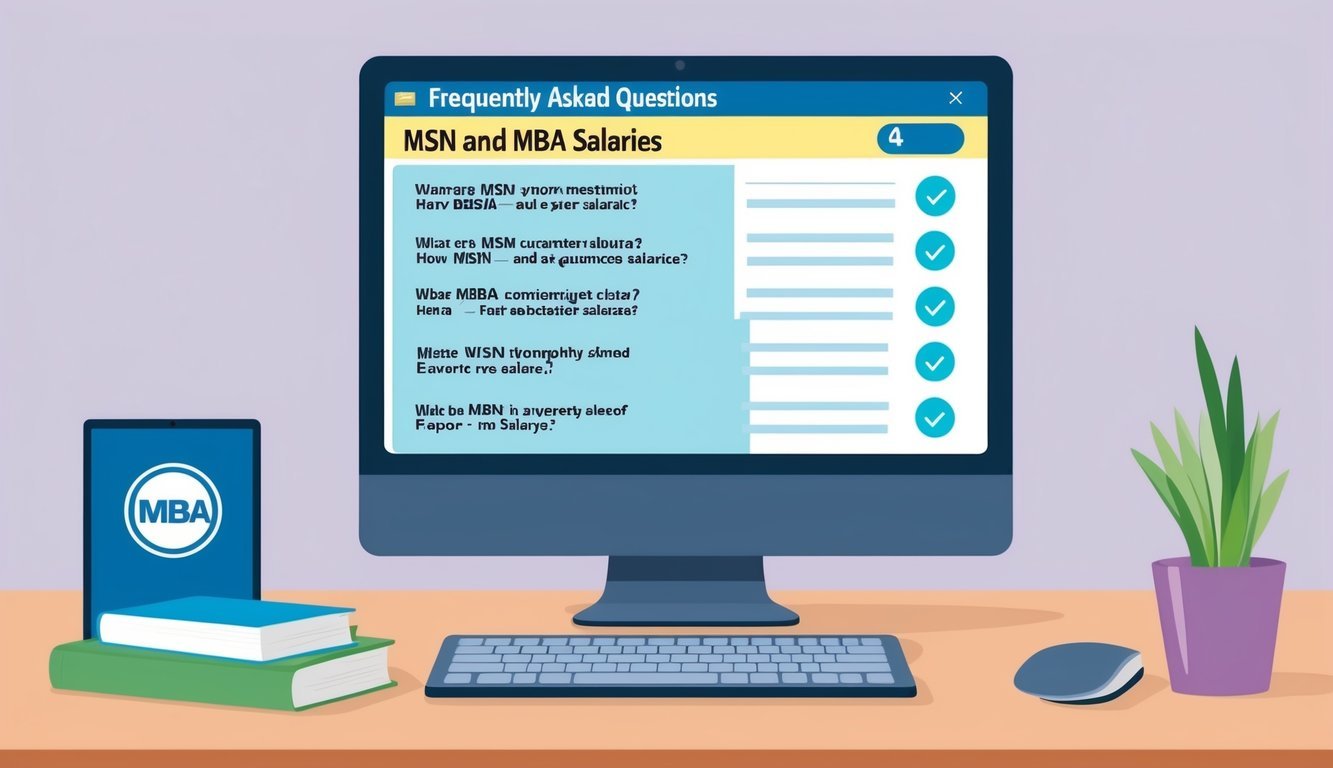The combination of a Master of Science in Nursing (MSN) and a Master of Business Administration (MBA) can significantly enhance your career prospects in healthcare. On average, experienced MSN/MBA professionals earn around $149,610 per year, making this dual degree an attractive option for those looking to advance in nursing leadership and management roles.
Pursuing an MSN/MBA dual degree not only provides you with advanced nursing skills but also equips you with essential business knowledge.
This blend of expertise opens doors to diverse career pathways in healthcare administration, finance, and policy-making.
As you consider this path, understanding the salary expectations and job outlook can help you make informed decisions about your educational investments.
The financial return from earning an MSN/MBA can be substantial, especially as the demand for educated leaders in nursing continues to grow.
Key Takeaways
- The average salary for MSN/MBA professionals is about $149,610 per year.
- Dual degrees offer a competitive edge in nursing leadership and management.
- Investing in your education can lead to diverse career opportunities in healthcare.
Overview of MSN/MBA Dual Degree
The MSN/MBA dual degree combines advanced nursing education with business skills.
This program prepares you for leadership roles in healthcare settings.
You gain expertise in both nursing and business administration, making you a valuable asset in the industry.
Understanding the MSN/MBA Dual Degree Program
The MSN/MBA dual degree program allows you to earn two advanced degrees simultaneously.
Typically, it requires fewer credits than pursuing each degree separately.
For example, some programs reduce the overall credit requirement from 120 to about 88 credits.
The curriculum encompasses both nursing theory and business practices.
You will study topics like healthcare management, finance, and policy, contributing to your nursing knowledge.
Programs can be completed online or in-person, offering flexibility for working professionals.
For example, at Texas Tech University, the MSN/MBA program reduces the required course load, cutting costs and time.
Benefits of a Dual Degree in Nursing and Business Administration
Pursuing an MSN/MBA dual degree offers several advantages.
First, it expands your career opportunities.
You can qualify for positions in nursing administration, healthcare consulting, and executive roles.
Additionally, graduates often enjoy higher salaries.
Those with dual degrees can leverage their knowledge to command competitive pay.
The average salary for MSN/MBA graduates is around $142,681 annually, which reflects the demand for professionals who understand both nursing and business.
Moreover, a dual degree gives you a holistic view of healthcare operations.
You will be prepared to make informed decisions as you balance patient care and business strategy.
Programs like those offered at Drexel University present various benefits to enhance your career.
Curriculum and Educational Requirements

Understanding the curriculum and educational requirements for MSN/MBA programs helps you prepare for this dual degree.
You will encounter specific admission criteria and key coursework designed to equip you with essential skills in both nursing and business.
Admission Requirements for Dual Degree Programs
To apply for an MSN/MBA dual degree program, you typically need a bachelor’s degree in nursing from an accredited institution.
Additional admission requirements often include:
- Current RN license
- Completed application form
- Letters of recommendation
- Personal statement or essay
- GRE scores may be required by some programs
It’s essential to check with each school for their specific criteria, as these can vary.
Many programs also offer online learning options, making it more convenient for working professionals.
Key Components of MSN/MBA Coursework
The coursework in an MSN/MBA program integrates both nursing and business principles.
Here are some key components you may encounter:
| Course | Focus Area |
|---|---|
| Nursing Leadership | Management techniques in healthcare |
| Health Policy | Understanding healthcare systems |
| Financial Management | Budgeting and financial planning |
| Marketing for Healthcare | Strategies to promote healthcare services |
| Advanced Nursing Practice | Clinical and patient care skills |
Courses emphasize practical skills, critical thinking, and decision-making abilities.
You’ll engage in both case studies and group projects, preparing you for leadership roles in healthcare settings.
Career Pathways and Leadership Roles

Earning an MSN/MBA can open doors to various executive and leadership positions in healthcare.
These roles often require a blend of clinical expertise and business acumen, making graduates highly sought after.
Below are some of the key pathways you may explore.
Executive Roles for MSN/MBA Graduates
With an MSN/MBA, you are well-positioned for executive roles in healthcare.
Some common positions include:
| Role | Responsibilities |
|---|---|
| Chief Nursing Officer (CNO) | Oversees nursing operations and ensures quality care. |
| Nursing Manager | Manages nursing staff and coordinates patient care. |
| Director of Nursing | Guides nursing policies and procedures. |
| Healthcare Executive | Leads healthcare organizations and manages budgets. |
These roles often involve strategic planning, management of resources, and collaboration with other departments.
You will likely be responsible for improving patient outcomes and ensuring regulatory compliance.
Nursing Leadership and Healthcare Management
In nursing leadership and healthcare management, strong decision-making skills are crucial.
Your responsibilities may include:
- Policy Development: Shaping strategies that align with healthcare regulations.
- Team Leadership: Leading nursing teams to enhance efficiency and morale.
- Financial Oversight: Managing budgets to ensure sustainable operations.
These roles require you to balance clinical knowledge with strategic business skills.
The ability to navigate complex healthcare environments will help you succeed and drive positive change.
For more information, check out resources from Nursing Leadership and Healthcare Management.
Salary Expectations and Job Outlook

When considering an MSN/MBA degree, understanding the salary expectations and job outlook is crucial.
This degree can lead to high earning potential and a strong demand for professionals in the healthcare field.
Average Salary for MSN/MBA Degree Holders
The average salary for individuals with an MSN/MBA degree is notably high.
According to recent data, you can expect to earn around $149,610 per year.
| Salary Breakdown | Amount |
|---|---|
| Hourly | $71.93 |
| Weekly | $2,877 |
| Monthly | $12,470 |
| Annual | $149,610 |
This figure showcases the significant return on investment for pursuing this dual degree.
With the right experience and location, your earnings may increase even further, making it a valuable choice in the nursing and healthcare leadership fields.
Market Demand and Career Outlook
The job market for MSN/MBA degree holders remains strong.
The demand for professionals in advanced nursing roles continues to grow.
Factors contributing to this demand include:
- Increasing healthcare needs: An aging population drives the need for more healthcare services.
- Leadership roles: Many healthcare organizations look for leaders with both nursing and business expertise.
According to the Bureau of Labor Statistics, advanced practice registered nurses (APRNs) are expected to see job growth of 45% from 2020 to 2030.
This growth rate is significantly higher than the average for all occupations, highlighting the bright future for professionals with an MSN/MBA degree.
Accreditation and Quality of Programs

Accreditation is vital for ensuring the quality and value of your MSN/MBA program.
It confirms that a program meets specific educational standards, which affects your degree’s recognition in the job market.
Understanding how to evaluate accreditation and the standards involved can help you make an informed decision.
Evaluating Program Accreditation and Standards
When choosing a dual MSN/MBA program, check for accreditation by recognized bodies.
The Commission on Collegiate Nursing Education (CCNE) and the Accreditation Commission for Education in Nursing (ACEN) are crucial accrediting agencies for nursing programs.
Programs accredited by these organizations have undergone rigorous evaluation.
This ensures that they meet high educational standards.
You can often find lists of accredited programs on the CCNE website.
Additionally, consider the reputation of the business school associated with the MSN/MBA program.
A program that is accredited by a reputable business school indicates a stronger focus on healthcare organizational leadership, which is essential for your career growth.
This dual preparation enhances your qualifications in both nursing and business fields.
Financial Considerations
Funding your MSN/MBA dual degree involves understanding tuition costs and exploring financial aid options.
These factors can significantly impact your overall investment in education, helping you make informed decisions for your future career.
Tuition Costs and Financing Your Degree
Tuition for MSN/MBA programs can vary widely based on the institution and its location.
On average, you might expect to pay anywhere from $30,000 to $70,000 for the entire program.
Some universities offer accelerated options that may help you save time and money while earning your degree.
These programs often require additional fees, such as registration and course materials.
Consider financing options such as student loans, which can spread payments over several years, or employer tuition reimbursement, which some healthcare organizations provide.
Scholarships and Financial Aid Options
You should explore scholarships specifically tailored for MSN/MBA programs.
Many schools offer financial aid packages that include need-based and merit-based scholarships.
A few examples of scholarship opportunities include:
- Healthcare Professional Scholarship: For those already working in the field.
- Diversity Scholarships: To support underrepresented groups in nursing and business.
In addition, federal aid like Pell Grants may be available.
Be sure to fill out the FAFSA form to determine your eligibility.
For more information on financial aid, visit FAFSA.gov.
Frequently Asked Questions

In this section, you will find answers to common questions about the salary expectations and career opportunities for MSN/MBA graduates.
The details cover average earnings, variations by state, and potential career paths.
What is the average salary for an MSN/MBA graduate in the United States?
The average salary for experienced MSN/MBA dual degree holders is approximately $149,610 per year.
This equates to around $71.93 per hour.
Many graduates leverage their education to command higher salaries compared to those with only a nursing degree.
How do the salaries for MSN/MBA graduates vary by state, such as in California?
Salaries for MSN/MBA graduates can differ significantly by state.
For example, in California, the average salary is generally higher due to the cost of living and demand for healthcare professionals.
You may find that graduates in major cities earn more compared to those in rural areas.
What are some of the potential career paths for individuals with an MSN/MBA dual degree?
With an MSN/MBA dual degree, you can explore various career paths.
These may include roles such as healthcare administrator, nurse manager, or clinical nurse leader.
The combination of nursing and business skills opens doors to leadership positions in healthcare organizations.
Which universities are considered the best for pursuing an MSN/MBA dual degree?
Many universities offer reputable MSN/MBA programs.
Institutions like Liberty University and others provide options that are well-regarded.
It’s essential to research which school fits your educational and career goals.
How does the duration of an MSN/MBA program typically compare to other professional degrees?
An MSN/MBA dual degree program usually takes 3-4 years for full-time students.
If you opt for part-time enrollment, expect to take longer.
This duration is often shorter compared to pursuing each degree separately.
What are the financial benefits of obtaining an MSN/MBA dual degree for nursing professionals?
Obtaining an MSN/MBA can lead to higher earning potential.
Graduates with this dual degree often earn around $68.60 per hour, significantly more than those with only a nursing degree.
The financial return on this investment can be substantial as career advancement opportunities increase.

